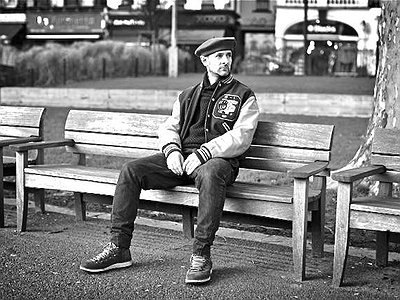Thanks to developments in the realm of software, DJing, playing live and producing have moved closer together than ever before, allowing DJs to change a track down the tiniest detail. In which way are you making use of these possibilities in your sets and in which way, do you feel, does the music benefit from them? Do you feel a crowd is actually able to appreciate the intricacies of complex DJing, if they don't actually know what, precisely, is happening behind the decks?
In no way at all am I making use of these 'possibilities'. I use 95% vinyl everywhere I go from Europe to Japan to the USA. Although I have no problem with other ways of playing, in my conventional method I like to hear great records, in a great order and mixed well. That is 100% enough for me and I’m not interested in changing or meddling with the tracks. DJs that feel the need to break down tracks into little parts and loops and use loads of the effects on mixers and so forth - well if it gives them pleasure or makes them feel valid - good for them. I don't wanna hear the tracks that I like messed with or altered so much. It makes me laugh as it's usually the DJs that play the most bland, monotonous, linear music that put such a big emphasis on these tools. Do you see Harvey, Andrew Weatherall, Marcel Dettman, Ben UFO or Zip going in for many of these things? No - they have the musical culture, knowledge and passion to create dynamic sets with the music alone and without all the gimmicks.
The relationship with the audience is crucial for a DJ, and yet it seems to be a fragile one. How do you see the balance between giving the crowd what they want and treating them to something new? Do you believe in the possibility of "reading an audience" – and how do you put it into practice? Is the relationship with the dancers a collaborative one or, as Derrick May once put it, a “battle”?
It’s both a battle and a collaborative effort. Of course there are times when I walk into a room and I’m like "hmmm this isn't going to be easy" and maybe on those occasions I have to play a more consistent higher energy for what I might perceive to be a less musically educated crowd. I am being paid after all to give these people a good time.
However you should never underestimate the crowd. When I have a situation as above I might go in harder or more immediate to give them what they want but I will get bored if I have to stick to a certain tempo or energy level all night, so gradually I will try to coax them into different moods and usually, but not always, this works out.
Of course the ideal situation is where I walk into a party like Robert Johnson or Panorama Bar or secretsundaze and I feel no pressure to play a certain way but know that I can totally be myself and that the people know your music, have even come to see you play, have heard one of your mixes and most importantly trust you. That trust helps you breathe as a DJ and feel free to do what you choose on that given occasion.
Could you try to describe what makes you decide to play a particular record during one of your sets? What makes a strong transition from one track to the next from your point of view, for example, and how do you see the relative importance of establishing a flow versus creating tension through suspenseful breaks in continuity?
I play records I like - that's pretty much it. Of course I try and set a mood and try to play records at the right time but not much more or less. I don't want to be difficult but I can't answer the question of what makes a strong transition. Some people like long smooth mixes, some like sudden chops. I usually go with my feeling and instinct and I might play six records in a row that are building up and up and all mixed smoothly then I might drop something more random, that is more sudden and less smooth because I get bored or want to move in a different direction.
A strong set can be truly be more than the sum of its parts. How, do you feel, is the music transformed in the hands of a DJ? In which way are you actively trying to create an experience that is more than just stringing together a few excellent records?
Yes for sure very much so. Music is transformed in the sense that timing is everything and it’s about pitching your records or presenting them in the right way. Music is given a new context when put next to other things. A record on its own can indeed be a great thing but when presented and linked to other records or 'joining the dots' as Giles Peterson would say, this can give records a whole new lease on life and relevance. It’s almost impossible to avoid terms like 'story telling' or 'going on a journey' and people cringe sometimes when these terms are used as if they are pretentious. However DJs should strive to story-tell and yes this means having a beginning, middle and ending and incorporating highs, lows and different emotions from joy and happiness to melancholy moods to pure darkness! I like to try and cover these different feelings when I DJ.
People are often speaking about the demise of the club scene, but the experience has remained as potent as ever. Why, do you feel, has the club remained such a great place for the discovery and appreciation of electronic music? How do you see the relationship between music and the space it is performed at?
People will always want to go out and have a good time. Life is hard for a lot of people with shitty jobs and ups and downs. I saw an interview with Charles Webster and he said 'DJing isn't that important in the grand scheme of things, like being a doctor saving lives etc, but it's still pretty important and you need to take it very seriously. People have a lot of stress in their lives and tonight they are coming to the club to see you play and you owe it to them to give them the best you have'. I thought this was a fantastic sentiment and something I never forget.
People go to clubs for many reasons - some to get girls / boys, some to get high and some to hear the music, but most of all I think people go to clubs to interact both with other people, the music and indeed the DJ. You cannot find this online or in a magazine. It's human contact and most importantly a shared experience. Shared experience and a community is something that is lacking from much of society and going to a club to share this sensory experience with other fellow humans is irreplaceable.
Of course escapism, release and self expression are also words that spring to mind if you look at some of the most important, liberal clubs such as the Paradise Garage and perhaps the modern day equivalent Panorama bar / Berghain. These were indeed pleasure domes and people can really let their hair down here and not be judged in these places. The relationship between the music and the space is totally intertwined. A DJ is going to play very differently in an open-air daytime party to a very dark club at 4am right?
In how much, do you feel, is the club experience shaped by cultural differences? Do you, when travelling, take these cultural differences into consideration – and in how far has your approach as a DJ perhaps even benefited from playing in different countries and in front of different crowds?
With globalisation - cheaper travel and of course that little thing the World Wide Web - people can access music and mixes very easily and get a good impression of a DJ's style. I don't feel that I particularly tailor my sound for each country per se. I mean in Tel Aviv they definitely like it deep and the crowd is very sexy and in tune with the more warm sound even at peak time, the Spanish are generally more into techno and although I haven't played there I am aware that South Africans are huge deep house fans but I don't feel that I change my style so much.
Please recommend two DJs to our readers which you feel deserve their attention.
Amir Alexander is someone that I am championing. He has a great technique, versatility and also is a great producer. Another could be Gerd Janson, he is a don. I mean he is such a great DJ again with all of the above and always comes correct. Ok I want 3….DVS1 on a more techno tip is totally killing it and up there with my favourites.
To read more about Giles Smith visit thesecretagency.net



